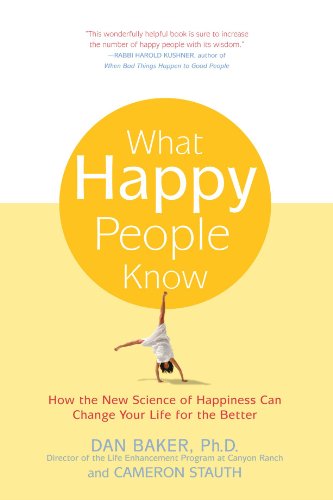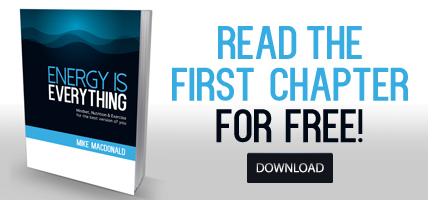I read an article recently that I found both sad and disturbing.
It was titled “You Can’t Be Fat And Happy” and claimed that exact point.
I find this to be a terrible message and feel compelled to write a rebuttal. So here goes…
Full disclosure: I don’t know what it’s like to be overweight. I especially don’t know what it’s like to be an overweight girl. Rather than offer an opinion, and project my personal experiences onto others, I’m going to consider what the evidence has to say…
How to be happy
According to the article, “Being clothed and fat is unhappiness”. However, our external circumstances – including whether or not we label ourselves ‘fat’ – perhaps don’t influence our happiness as much as we’d expect. In fact, one study suggests that lottery winners are no happier than paralysed accident victims,[i].
Hard to believe, I know. How can that be possible?
It’s possible when we discover the relationship with gratitude, well-being and overall satisfaction with life,[ii],[iii],[iv]. It’s possible when we note the relationship with acts of kindness and happiness,[v],[vi]. How trying new things,[vii] and being creative,[viii] enhance our happiness.
Can a paralysed person practice gratitude? Can they appreciate the little things in life? Can they find joy in the mundane? Can they be kind and creative? Can they try new things? Of course they can.
Can a ‘fat’ person do this? No doubt.
Pleasure, engagement and meaning are what predict life satisfaction,[ix]. Indeed, famed psychologist Mihaly Csikszentmihalyi developed his theory of flow,[x] around the concept of engagement. Flow is being ‘in the zone’, lost in the moment of a deep connection to our task.
“My studies have suggested that happiness depends on whether a person is able to derive flow from whatever he or she does.” (Mihaly Csikszentmihalyi,[xi])
Can a ‘fat’ person experience flow? No doubt.
I’m not suggesting happiness is easy. We have to work at it like everything else. But it’s easy to fool ourselves when it comes to what we think makes us happy. Happiness tends not to come from externals – materialism has been consistently related to lower levels of life satisfaction,[xii].
“He’s here but he’s not here. He rejects the here, is unhappy with it, wants to be farther up the trail but when he gets there will be just as unhappy because then it will be ‘here’. What he’s looking for, what he wants, is all around him, but he doesn’t want that because it is all around him. Every step’s an effort, both physically and spiritually, because he imagines his goal to be external and distant.” (Zen & the Art of Motorcycle Maintenance)
Can you be ‘fat’ and happy? No doubt.
The questionable motivation of the ‘truth hurts’ message
My second argument is around the ‘motivational’ nature of messages like these.
First up: You cannot motivate a person with shame or guilt. It just doesn’t help.
While there might be exceptions, research suggests people generally respond more favourably to messages focussed on making healthy behavioural changes than they do to negative content around being overweight,[xiii]. The author’s “tender spot in my heart for fat girls in the process of doing something to change it”, is incredibly patronising.
Moreover, using the label ‘fat’ increases negative attitudes toward people compared with the label ‘overweight’,[xiv]. And overweight people already face too much prejudice,[xvi],[xvi]. Rather than motivate, the ‘truth hurts’ approach actually makes people more likely to become obese!,[xvii] And that’s not to mention what it does for their mental health.
The imagery accompanying the article: a picture of a person clawing at their own stomach, is also unhelpful. What message does that convey? Should we hate ourselves if we are overweight? Does it make us unworthy? Is self-loathing the way forward?
Attaching our self-worth to how we look is a bad idea. Besides, we don’t say “I am a broken leg or I am cancer”. Why do we say “I am fat?” Excess body fat is something we have; not something we are.
Since self talk is so powerful, it’s important to choose your words carefully. If you use destructive language, you’ll muddy your wisdom and create perceptions that can ruin your life. (Baker & Stauth, What Happy People Know,[xviii])
The dark side of health & fitness
Would losing weight mean an increase in the quality of a person’s life? Quite possibly. We know that several negative health outcomes are associated with overweight and obesity.,[xix],[xx],[xxi]
But there is also a dark side to health and fitness. In pursuit of the aesthetic ideal which we believe will ensure our happiness, it’s easy to fall into extreme behaviours. Exercising for weight, tone, and attractiveness reasons is highly correlated disordered eating behaviour,[xxii] and, in females, overall activity level is related to greater “eating disturbance”.
With that being said, the author’s boast that “For the first several months, I exclusively worked the fuck out, continued to work out, and worked out some more”, is a red flag and another questionable message to be spreading.
Perhaps it’s preferable to be fit, lean and healthy than to be overweight or unwell. It’s great to improve the way we look, feel and perform. But working in the health and fitness industry, I’m increasingly aware of a line. There’s a line between improving our life and falling into an unhealthy obsession.
“The great source of both the misery and disorders of human life, seems to arise from over-rating the difference between one permanent situation and another… Some of those situations may, no doubt, deserve to be preferred to others: but none of them can deserve to be pursued with that passionate ardour which drives us to violate the rules either of prudence or of justice; or to corrupt the future tranquility of our minds, either by shame from the remembrance of our own folly, or by remorse from the horror of our own injustice.” (Adam Smith, The Theory of Moral Sentiments, 1759)
Promoting change
If our goal is to inspire, motivate and facilitate change in overweight individuals, negative messages, imagery and anti-fat attitudes is not the way to do it.
It can be frustrating – especially wihen it’s those close to us – but people have to be ready to change. Using shame or guilt in an attempt to motivate is unhelpful and potentially harmful.
Being overweight does not make a person unworthy. And yes, you can be overweight and happy.
BIG IDEA 1: Happiness tends not to come from externals.
TAKEAWAY 1: Practising gratitude, kindness, creativity and trying new things promote happiness. Happiness also comes through ‘flow’: a deep engagement with our task. You can be ‘fat’ and happy.
BIG IDEA 2: You cannot motivate a person with shame or guilt.
TAKEAWAY 2: People respond more favourably to positive messages around health behaviours than negative, anti-fat attitudes and stigma.
ACTION STEP: Want to read more? Click the button below to download the first chapter of my book.
Always Keep Reaching!
Mike
References
[i] Brickman P, Coates D, Janoff-Bulman. Lottery winners and accident victims: is happiness relative? J Pers Soc Psychol. 1978 Aug;36(8):917-27. http://www.ncbi.nlm.nih.gov/pubmed/690806
[ii] Alex M. Wood, Jeffrey J. Froh, Adam W.A. Geraghty. Gratitude and well-being: A review and theoretical integration. Clinical Psychology Review Volume 30, Issue 7, November 2010, Pages 890–905 http://www.sciencedirect.com/science/article/pii/S0272735810000450
[iii] Alex M. Wood, Stephen Joseph, John Maltby. Personality and Individual Differences. Gratitude uniquely predicts satisfaction with life: Incremental validity above the domains and facets of the five factor model. Volume 45, Issue 1, July 2008, Pages 49–54 http://www.sciencedirect.com/science/article/pii/S0191886908000767
[iv] Emmons R, McCullough ME. Counting blessings versus burdens: an experimental investigation of gratitude and subjective well-being in daily life. J Pers Soc Psychol. 2003 Feb;84(2):377-89. http://www.ncbi.nlm.nih.gov/pubmed/12585811
[v] Keiko Otake, Satoshi Shimai, Junko Tanaka-Matsumi, Kanako Otsui, Barbara L. Fredrickson. Happy People Become Happier through Kindness: A Counting Kindnesses Intervention. Journal of Happiness Studies September 2006, Volume 7, Issue 3, pp 361-375. http://link.springer.com/article/10.1007%2Fs10902-005-3650-z
[vi] Lara B. Aknin, Elizabeth W. Dunn, Michael I. Norton. Happiness Runs in a Circular Motion: Evidence for a Positive Feedback Loop between Prosocial Spending and Happiness. Journal of Happiness Studies April 2012, Volume 13, Issue 2, pp 347-355 http://link.springer.com/article/10.1007%2Fs10902-011-9267-5
[vii]Kathryn E. Buchanan & Anat Bardi. Acts of Kindness and Acts of Novelty Affect Life Satisfaction. The Journal of Social Psychology Volume 150, Issue 3, 2010 pages 235-237. http://www.tandfonline.com/doi/abs/10.1080/00224540903365554#.Uybkmty89g1
[viii]Tammy C. Pannells & Amy F. Claxton. Happiness, Creative Ideation, and Locus of Control. Creativity Research Journal Volume 20, Issue 1, 2008 pages 67-71. http://www.tandfonline.com/doi/abs/10.1080/10400410701842029#.Uyb_R9y89g0
[ix] Christopher Peterson, Nansook Park, Martin E. P. Seligman. Orientations to happiness and life satisfaction: the full life versus the empty life. Journal of Happiness Studies 2005, Volume 6, Issue 1, pp 25-41 http://link.springer.com/article/10.1007/s10902-004-1278-z
[x] Mihaly Csikszentmihalyi. Flow: The classic work on how to achieve happiness. http://amzn.to/17ImtH2
[xi] Mihaly Csikszentmihalyi. If We Are So Rich, Why Aren’t We Happy American Psychologist October 1999, Volume 54 Number 10 http://www.owlnet.rice.edu/~erinm/Mihaly.html
[xii] Jo-Ann Tsang et al. Why are materialists less happy? The role of gratitude and need satisfaction in the relationship between materialism and life satisfaction. Personality and Individual Differences. Volume 64, July 2014, Pages 62–66 http://www.sciencedirect.com/science/article/pii/S0191886914001019
[xiii] Puhl R1, Peterson JL, Luedicke. Fighting obesity or obese persons? Public perceptions of obesity-related health messages. J.Int J Obes (Lond). 2013 Jun;37(6):774-82. doi: 10.1038/ijo.2012.156. Epub 2012 Sep 11. http://www.ncbi.nlm.nih.gov/pubmed/22964792/
[xiv] Brochu, P. M. and Esses, V. M. (2011), What’s in a Name? The Effects of the Labels “Fat” Versus “Overweight” on Weight Bias. Journal of Applied Social Psychology, 41: 1981–2008. http://onlinelibrary.wiley.com/doi/10.1111/j.1559-1816.2011.00786.x/abstract
[xv] Tatiana Andreyeva, Rebecca M. Puhl and Kelly D. Brownell. Changes in Perceived Weight Discrimination Among Americans, 1995–1996 Through 2004–2006. Obesity (2008). http://www.yaleruddcenter.org/resources/upload/docs/news/Obesity-2008.pdf
[xvi] Rebecca M. Puhl, Chelsea A. Heuer. Obesity Stigma: Important Considerations for Public Health. Am J Public Health. 2010 June; 100(6): 1019–1028. http://www.ncbi.nlm.nih.gov/pmc/articles/PMC2866597/
[xvii] Sutin AR, Terracciano A (2013) Perceived Weight Discrimination and Obesity. PLoS ONE 8(7): e70048. http://www.plosone.org/article/info:doi/10.1371/journal.pone.0070048
[xviii] Baker & Stauth. What Happy People Know: http://amzn.to/1cdJqBF
[xix] Chan JM, Rimm EB, Colditz GA, Stampfer MJ, Willett WC. Obesity, fat distribution, and weight gain as risk factors for clinical diabetes in men. Diabetes Care. 1994 Sep;17(9):961-9. http://www.ncbi.nlm.nih.gov/pubmed/7988316
[xx] Whitlock G, Lewington S, Sherliker P, Clarke R, Emberson J, Halsey J, Qizilbash N, Collins R, Peto R. Body-mass index and cause-specific mortality in 900 000 adults: collaborative analyses of 57 prospective studies. Lancet. 2009 Mar 28;373(9669):1083-96. doi: 10.1016/S0140-6736(09)60318-4. Epub 2009 Mar 18. http://www.ncbi.nlm.nih.gov/pubmed/19299006
[xxi] Field AE, Coakley EH, Must A, et al. Impact of Overweight on the Risk of Developing Common Chronic Diseases During a 10-Year Period. Arch Intern Med. 2001;161(13):1581-1586. doi:10.1001/archinte.161.13.1581. http://archinte.jamanetwork.com/article.aspx?articleid=648604
[xxii] McDonald, K. and Thompson, J. K. (1992), Eating disturbance, body image dissatisfaction, and reasons for exercising: Gender differences and correlational findings. Int. J. Eat. Disord., 11: 289–292. http://onlinelibrary.wiley.com/doi/10.1002/1098-108X(199204)11:3%3C289::AID-EAT2260110314%3E3.0.CO;2-F/abstract







![My Nutrition Rabbit Hole (and why I quit Paleo) [Part 2]](https://www.mikemacdonald.co.uk/wp-content/uploads/2014/06/Latin-America-Food-150x150.png)
Hi Mike, good food for thought. I often think about what exactly ‘happiness’ is and have contemplated this on my own Blog. I believe anyone can be happy because happiness is subjective and based on your state of mind. I guess the reason for this ‘fat people can’t be happy’ is based on someone’s mistaken (in my own opinion) belief that happiness is based on societal perceptions of body image. I think it’s a very big assertion to make but I assume it was just to sell a book or increase hits on a web page i.e. controversial statements sell. People are intrigued by them. I’ve not read this myself so I am just going on assumption. As someone who has suffered stigma for being too thin, I think that you could say the same about thin people. The big difference is that for some reason people think it’s acceptable to comment on someone’s weight when they are too slim and are more likely to make nasty jibes than if someone was overweight. In sum, I don’t think body size is the basis for ANYONE’S happiness. These are just my own thoughts though and no doubt others will disagree.
Hi Joanna,
Thanks for commenting and I totally agree. I’ve worked with underweight clients and they’ve expressed the same point about the apparent acceptability of critiquing a ‘thin’ body. It doesn’t help.
I also know plenty of people who are unhappy with their body despite being in great shape. For me, where you are inside your head matters more than where you are in the world.